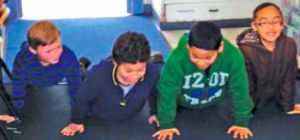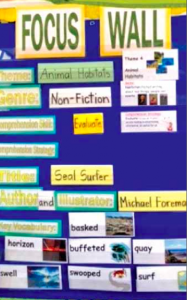Roosevelt School Teacher Uses Drama to Help Students Learn Vocabulary
by Roosevelt Principal Trish Girardi and Roosevelt parent Trish Taylor for Spectrum Magazine, May 2013
Update: Since the publication of this article, it has been announced that Gillian Parkhurst has been awarded the San Mateo County Reading Association’s Celebrate Literacy Award for 2013.
Memorizing a dictionary entry may give students the ability to recite a word’s definition, but how do students develop an in-depth understanding of what a word means? Teacher Gillian Parkhurst at Roosevelt School in Redwood City found a creative and engaging way to capture the interest of her third-grade students each time she introduces a new set of vocabulary words. She challenges students to work together in teams and create skits depicting their chosen vocabulary word.
Teacher Gillian Parkhurst introduces vocabulary words on the Focus Wall in week one.
Students have fun with their classmates while learning new words as they craft vignettes, using dialogue and gestures. Each member of the team comes up with an idea for the skit that illustrates the definition behind the selected word. When performing, the third-grade audience watches their classmates act out their interpretation of the word and looks for clues in order to guess which word is being presented.
 Students discuss how to act out their vocabulary word.
Students discuss how to act out their vocabulary word.
Learning vocabulary through skits builds students’ academic and content vocabulary and supports their reading comprehension so that all students become proficient readers.
 Students working together to create the skit using movement.
Students working together to create the skit using movement.
Parkhurst develops students’ love of language through this playful, performance-based activity. Students are highly engaged and develop a love of language. Public speaking and acting out the vocabulary solidifies students’ knowledge of the meaning of the word. The students in the audience must be alert to the nuances of the performance, always cognizant of the “vocabulary list of words” from which they will choose.
Throughout the year, new vocabulary words are introduced every two weeks and are linked to their reading series. Students eagerly await the preview of the new vocabulary and their new team assignment. During the first week, students are introduced to their new vocabulary words and learn about them through a variety of classroom activities. In the second week they get ready for their performance by working with other students in a group. During the performance, all students play an active role and other students in the class guess the meaning of the word.
By the end of the two-week unit of study, all students in the classroom have mastered the vocabulary. This improves their self- confidence as well as helps to increase their reading levels.
As the year progresses, students become more active participants, developing their oral language skills as well as comprehension linked to the vocabulary being taught.

Recent Comments